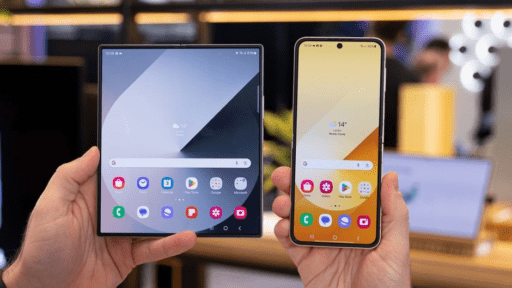Google and Samsung in hot antitrust water over Gemini AI on Z Fold 6 and S24

Samsung Electronics unveiled its newest 2024 foldable smartphones, the Galaxy Z Fold 6 and Flip 6, at a Galaxy Unpacked event in Paris last week. Just like the Galaxy S24 series before them, the Galaxy Z Fold 6 and Galaxy Z Flip 6 come with the Google Gemini app already preinstalled.
Gemini is Google’s artificial intelligence engine used to interpret context. On the 2024 Samsung flagships, it can be evoked by the “Hey Google” phrase, or by swiping up from the bottom corner of the screen to trigger the Gemini overlay.
The Galaxy phones heralded the arrival of smartphones with built-in AI, as their owners could, for example, quickly search for something only by drawing a circle on the screen when they encounter something while browsing the web or social media, rather than opening various search apps. Said Circle to Search is implemented on the Galaxy S24, Z Fold 6, or Z Flip 6 by using AI services like Gemini Nano and Gemini Pro in close collaboration with Google.
This partnership, however, has now attracted the attention of the European Commissions’s antitrust regulators. According to Reuters, “industry participants” have been presented with an 8-page questionnaire today, inquiring about the circumstances surrounding the launch of a smartphone with Google’s artificial intelligence service, Gemini.
The goal is to investigate whether any unfair actions, such as stifling competition from other AI firms, were committed throughout the process of integrating Gemini into Samsung Galaxy phones.
The probe is not without merits, as the whole Google Apps suite is connected to Gemini. When Gemini is asked to find a sightseeing place, it defaults to Google Maps, for instance, and pulls up Google’s ravel and reservation info. The EU is now investigating whether the AI services that resulted from this partnership are subject to antitrust laws. Samsung Electronics is basically asked if it had explored using AI chatbots from companies other than Google.
If the EU determines that the contracts between Google and Samsung Electronics breach its notorious Digital Markets Act legislation that has already been used to force Apple to open its iOS ecosystem to third-party apps, the two could be subject to a fine.
In general, companies found in violation of the DMA act can be fined up to 10% of their global sales, a jaw-dropping amount for companies like Google or Samsung. It probably won’t come to that, but “the commercialization of AI and its powerful tools is going to be led by a few companies that already have a lot of market power, so we remain vigilant,” says Margrethe Vestager, the EU’s competition commissioner.
Apple already had to agree to a lot of atypical behavior to placate the requirements in the European Union’s Digital Markets Act, so the legislation is not toothless, either. From a hardware standpoint, Apple changed all charging and data ports on its iPhone 15 models to the USB-C standard, while when it comes to software, iOS in the EU allows freedom never before seen on iPhones.
Even Apple’s default App Store, for instance, the standard-bearer of the iOS ecosystem, can now be circumvented for third-party app stores that offer retro game and even PC emulators. IT recently agreed to allow other mobile payment systems besides Apple Pay, too, as well as third-party browsers and the like.
Just like Google and Samsung are facing scrutiny over the Galaxy AI features based on the Gemini platform, the European Commission could very well prevent Apple from integrating its own AI efforts on the iPhone and iPad. With iOS 18, Apple announced its own tie-up with OpenAI’s ChatGPT bot that will be integrated on iPhone 15 Pro and iPhone 16 models as part of the Apple Intelligence suite.